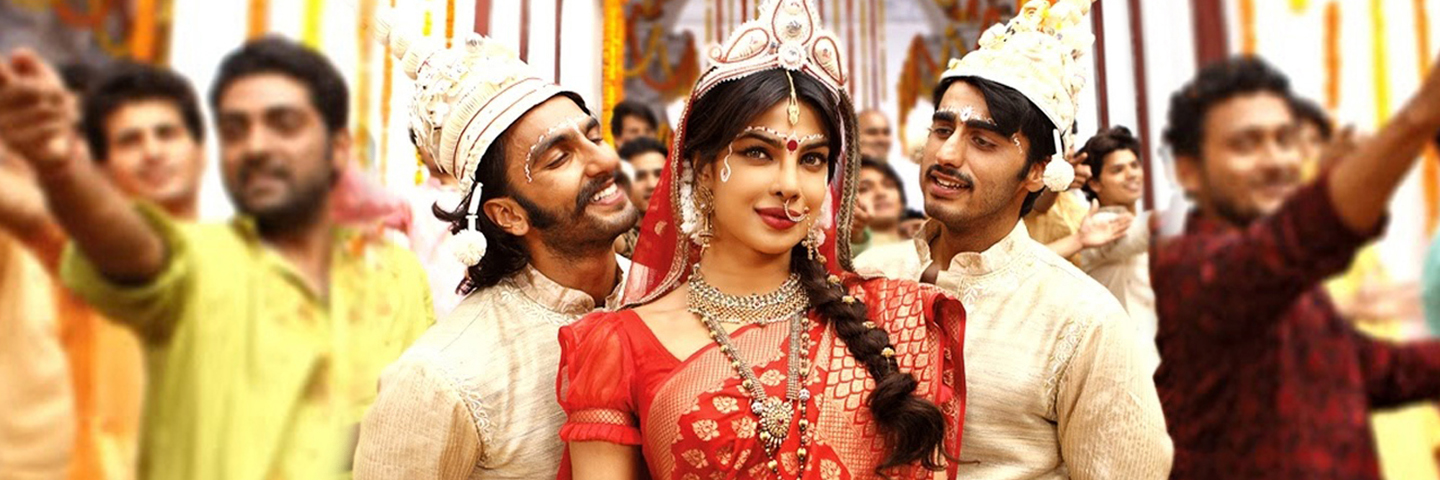Music: SOHAIL SEN
Lyrics: IRSHAD KAMIL & ALI ABBAS ZAFAR Bengali song by BAPPI LAHIRI & GAUTAM SUSMIT
Music Label: YASH RAJ MUSIC
Expectations:
The action drama itself is highly anticipated, and music plays a large role in the first attraction for a Hindi film audience. The composer's past track-record isn't exactly very successful, though he had a few chartbusters in What's Your Raashee? and Mere Brother Ki Dulhan.
Music:
First, let us compliment Irshad Kamil, the man who believes in high creative standards even in popular or fun songs, for writing truly elegant lyrics. The Sufi-heavy tenor is pardonable as his brief seems to be to deliver that, and Kamil's kaabiliyat (kamil-iyat? ) is seen in the simplicity (that is extremely difficult to attain) in both the lighter as well as heavier numbers.
One such sparkling example is the passage 'Mujh se main rootha' Mujh mein main toota / Mujhko maine ishq wafaa mein / Khud hi hai loota' in the Sufi-ana qawwali, 'Saiyyan', that is brilliantly rendered by Shahid Mausam Mallya. Kamil's mastery in the Sufi ethos is also seen ('Gunaah mere bade hain / Hai tera dil bhi bada / Yakeen hai maaf karega / Tabhi hoon dar pe khada') in the awesomely-composed 'Mann kunta maula', which has a fascinating 'classical' version as well. Though the latter isn't all that raag-heavy compared to the former, singers Shadab Faridi and Altamash Faridi infuse a wealth of expression in this qawwali.
The orchestration is impressive in both parts, though one wishes that the treatment was more acoustic in the former. The latter version is purer in tenor and impresses much more.
At the other extreme, Irshad has a ball writing 'Toone maari entriyaan' (sung by two composers, Vishal Dadlani and Bappi Lahiri, with KK and Neeti Mohun, each of whom, especially Neeti, go all out to have a blast!). His desi plurals of English words ('commentriyaan', 'warrantiyaan') reflects current spoken lingo in almost every nook and cranny of India in this age. In short, Irshad shows a terrific versatility for a man who is erroneously only considered a serious writer!
The smooth flow of Sohail's composition reminds us of the recent folk-rich scores of Goliyon Ki Rasleela - Ram-Leela and R…Rajkumar in their instant magnetic appeal. The heady beats and the perfect orchestration make it an instant crowd-puller. Inarguably, this is going to be Sohail's career-biggest chartbuster as of now. And never mind if a significant part of the antara seems inspired by R.D. Burman's style. The percussion is novel and rich and the unusual use of the guitar is a highlight. Its Bengali version is written by Bappi Lahiri and Gautam Susmit and is sung neatly by Bappi and Monali Thakur.
The very contemporary beginning of 'Jiya' (Arijit Singh) at first listen, seems very run-of-the-mill, but as we go through the musical phrasing, we understand that this is no ordinary composition. However, the balancing here could have been more voice-friendly, especially as Arijit sounds softer than the norm. And yes, the song needed a big sound rather than the synthetic one.
A word about Arijit - he seems to be evolving into a nuanced singer with a distinct voice. A future school, perhaps, like Rafi, Mukesh or Kishore?
The opening track, 'Jashn-e-ishq' is perhaps the most ordinary track on the score, and we wonder why it is placed at the beginning of the soundtrack rather than the extraordinary 'Toone maari entriyaan.' This does not mean that the song isn't catchy - it is. Infectiously written, sung and composed, it could find a place in any album, no questions asked, rather than fit into the specific sound of Gunday.
By now, Javed Ali has perfected the art of cloning Sonu Nigam even in the higher octaves, and unoriginal voices will always pale before an original co-singer, which happens here with Shadab Faridi, who effortlessly dominates. The lyrics once again grab attention.
The other routine track is the Ali Abbas Zafar-written 'Gunday' that seems like a mélange of modern notes, with English rap (by Kinga Rhymes) coming in a bygone Bengal era! Sohail Sen gets trendy and this song's only novelty is a melodic line somewhat similar to 'Vande Mataram'.
'Assalam-e-ishqum' (Neha Bhasin-Bappi Lahiri) is a spirited rendition, though there are similarities in the interludes within the antara to the musical hook of 'Badtameez dil' from Yeh Jawaani Hai Deewani.
'Rhythm of Jashn-e-Ishqa' (Shadab Faridi) is more like a theme track, and this time Shadab sounds as if he is a second Sukhwinder Singh. There is more noise and cacophony here than rhythm.
Overall:
But on the whole, Sohail Sen seems to have finally got his act right. His songs have immense popular appeal, substance and the right blend of melody and contemporary styles. The Sufi angle and the Punjabi dilution seem out of place in a Bengal-based film but we guess a composer and lyricist cannot override the director's vision.
This soundtrack goes one better than the last Ali Abbas Zafar-YRF-Sohail Sen combination in Mere Brother ki Dulhan.
Our Pick:
Toone maari entriyaan, Jiya, Saaiyan, Mann kunto maula

